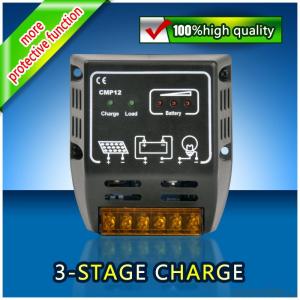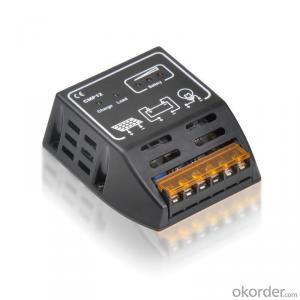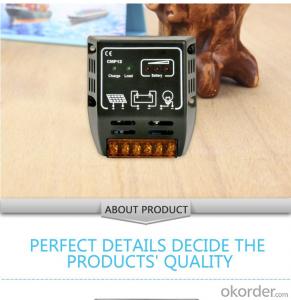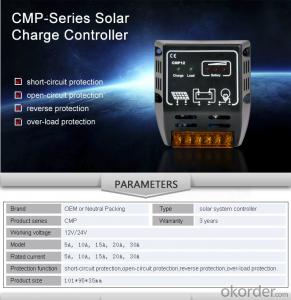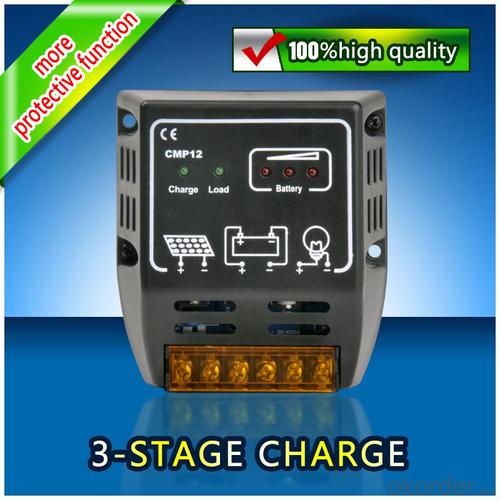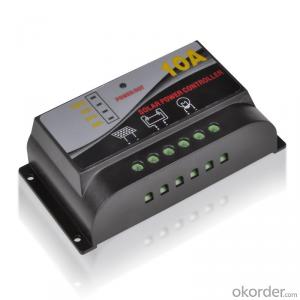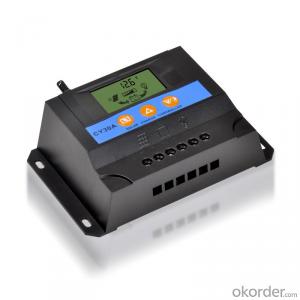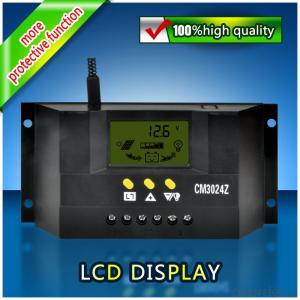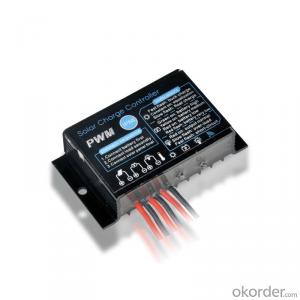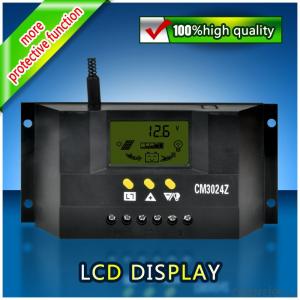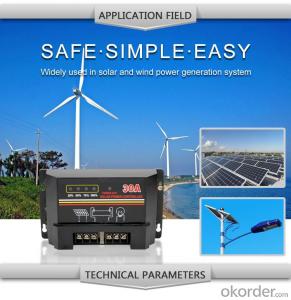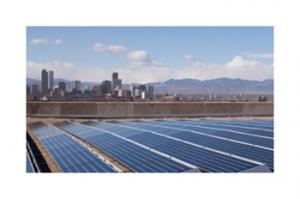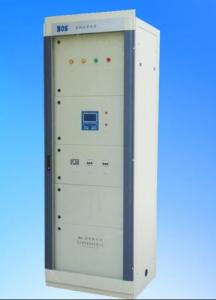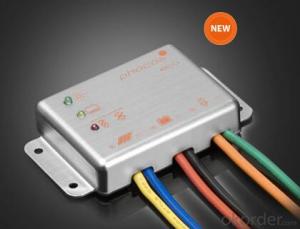Solar Charge Controllers for Sale:Solar LCD Controller CMP1210 with Best Price
- Loading Port:
- China main port
- Payment Terms:
- TT or LC
- Min Order Qty:
- 1 unit
- Supply Capability:
- 10000 unit/month
OKorder Service Pledge
OKorder Financial Service
You Might Also Like
Production IntroductionSolar controller is control device which can control solar panel and transform solar energy into electricity then store to the battery bank. Solar controller is the most important part in offgrid system, whose performance has much effect on life expectancy and operation of the whole system, especially the battery expectancy.
Application Areas
Standalone Photovoltaic power station
Standalone Domestic household photovoltaic power system
Mobil communication base stations, expressway and other non-residential regions.
Coastal islands, remote mountainous, border posts for regions shortage of or without electricity.
Government demonstration projects, landscape lighting project etc.
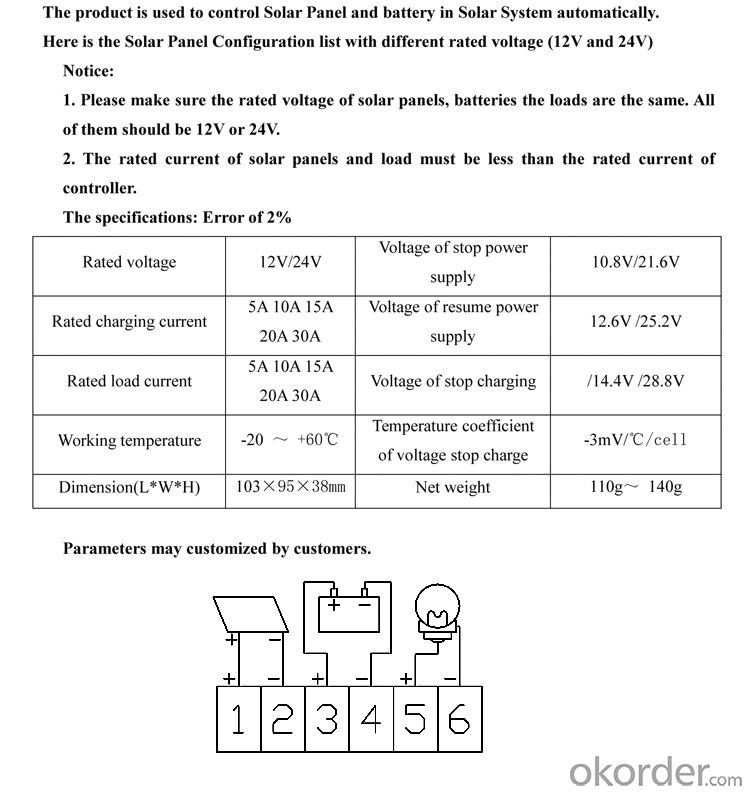
Selection of high-quality materials properties be consistent from beginning to end
For life is a convenient
A little more secure
The innovation design idea of the perfect show
The first set of people-oriented
The high-end configuration components
- Q: Can a solar controller be used with a solar-powered warehouse or distribution center?
- Yes, a solar controller can be used with a solar-powered warehouse or distribution center. A solar controller is essential for regulating the flow of electricity from the solar panels to the batteries, ensuring optimal charging and preventing overcharging or damage. It helps maximize the efficiency and lifespan of the solar power system, making it an essential component for any solar-powered facility, including warehouses and distribution centers.
- Q: How does a solar controller handle temperature fluctuations?
- A solar controller handles temperature fluctuations by continuously monitoring the temperature and adjusting the charging parameters accordingly. It regulates the flow of power from the solar panels to the batteries, ensuring that the batteries are charged optimally and preventing damage due to overcharging or undercharging. Additionally, advanced solar controllers may feature temperature compensation, where they adjust the charging voltage based on the ambient temperature to maximize the efficiency and lifespan of the batteries.
- Q: How does a solar controller handle battery desulfation?
- A solar controller handles battery desulfation by periodically applying a high voltage pulse to the battery, which helps break down and remove sulfation buildup on the battery plates. This process helps to rejuvenate the battery and improve its overall performance and lifespan.
- Q: Can a solar controller be used in hybrid systems?
- Yes, a solar controller can be used in hybrid systems. A solar controller is used to regulate the charging and discharging of a solar battery bank, ensuring that it operates efficiently and safely. In a hybrid system, which combines multiple sources of energy such as solar, wind, and grid power, a solar controller can play a crucial role in managing the flow of energy from the solar panels to the battery bank. It can monitor the voltage and current generated by the solar panels and adjust the charging parameters accordingly. Additionally, a solar controller can also provide important data and statistics about the solar energy production in a hybrid system, allowing for better monitoring and optimization of the overall energy generation and consumption. Therefore, a solar controller is a valuable component that can be successfully integrated into hybrid systems to enhance their performance and efficiency.
- Q: What is the role of a solar controller in preventing battery over-discharge?
- The role of a solar controller in preventing battery over-discharge is to monitor the energy levels of the battery and regulate the charging and discharging process. It ensures that the battery is not drained beyond a certain threshold, which helps to prolong its lifespan and prevent irreversible damage. The solar controller acts as a safeguard by disconnecting the load from the battery when it reaches a low voltage, preventing over-discharge and maintaining the battery's overall health.
- Q: How does a solar controller prevent damage to the solar panels?
- A solar controller plays a crucial role in preventing damage to solar panels by regulating the flow of electricity between the panels and the battery or grid. It acts as a barrier between the solar panels and the energy storage system or load, ensuring that the panels operate within their optimal parameters. Firstly, a solar controller prevents overcharging of the battery by monitoring the voltage and current levels. When the battery reaches its full capacity, the controller will automatically disconnect the panels from the battery, preventing any excessive charging that could lead to damage or reduced battery lifespan. Secondly, a solar controller protects the panels from reverse current flow during the night or periods of low sunlight. Without a controller, the battery or grid could discharge back into the panels, causing damage or reducing their overall efficiency. The controller's blocking diode prevents this backflow, ensuring that the panels remain safe and functional. Furthermore, a solar controller safeguards the panels against potential electrical surges or fluctuations. It typically includes built-in protection mechanisms like voltage and temperature sensors, which monitor the operation of the panels. If any irregularities or potential risks are detected, the controller can disconnect the panels from the system, preventing any damage that could occur due to overvoltage or overheating. In addition, some advanced solar controllers come with features like maximum power point tracking (MPPT) technology. MPPT controllers optimize the solar panel output by finding the optimal voltage and current combination that maximizes power production. This not only improves the overall efficiency of the system but also prevents potential damage that could occur due to overloading or underutilization of the panels. Overall, a solar controller acts as a safeguard for solar panels, preventing damage by regulating the flow of electricity, preventing overcharging, blocking reverse current flow, protecting against electrical surges, and optimizing the panel's performance. It ensures that the panels operate within their safe and efficient operating ranges, thus extending their lifespan and maximizing their energy production.
- Q: Can a solar controller be used in a solar-powered water pumping system?
- Yes, a solar controller can be used in a solar-powered water pumping system. A solar controller helps regulate and optimize the charging of batteries in a solar system, ensuring efficient use of solar energy and preventing overcharging or damage to the batteries. In a solar-powered water pumping system, a solar controller can help manage the power input from the solar panels and control the charging of batteries used to store solar energy, ultimately maximizing the efficiency and performance of the water pumping system.
- Q: How do I protect a solar controller from theft or vandalism?
- There are a few effective measures you can take to protect a solar controller from theft or vandalism. Firstly, consider installing the controller in a secure and inconspicuous location, making it less visible and accessible to potential thieves. Additionally, you can use tamper-proof screws or locks to secure the controller's enclosure, making it harder to remove. Installing a surveillance camera or an alarm system in the vicinity can act as a deterrent and help in identifying any suspicious activity. Lastly, it's advisable to clearly mark the solar controller with warning signs indicating surveillance or security measures, which can discourage potential vandals or thieves.
- Q: Can a solar controller be used with solar panels of different colors?
- Yes, a solar controller can be used with solar panels of different colors. The color of the solar panels does not affect the functionality of the solar controller, as it is designed to regulate the voltage and charge the batteries connected to the solar system, regardless of the color of the panels.
- Q: What is the solar controller system voltage? Solar controller battery terminal connected to 12V battery, the load side can be directly connected to the 12V DC lamp?
- Solar controller is called solar charge and discharge controller, is used in solar power system, the control of multi-channel solar cell battery charging and battery to the solar inverter load power supply automatic control equipment.
Send your message to us
Solar Charge Controllers for Sale:Solar LCD Controller CMP1210 with Best Price
- Loading Port:
- China main port
- Payment Terms:
- TT or LC
- Min Order Qty:
- 1 unit
- Supply Capability:
- 10000 unit/month
OKorder Service Pledge
OKorder Financial Service
Similar products
Hot products
Hot Searches
Related keywords
